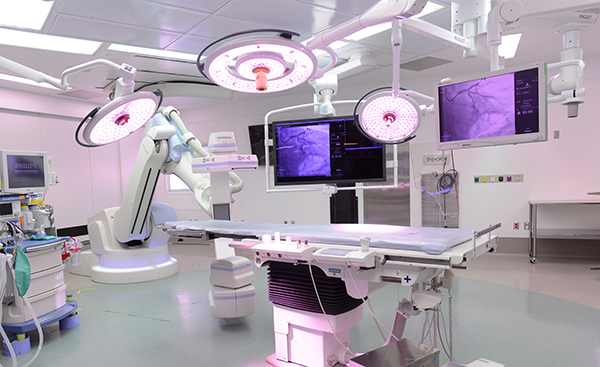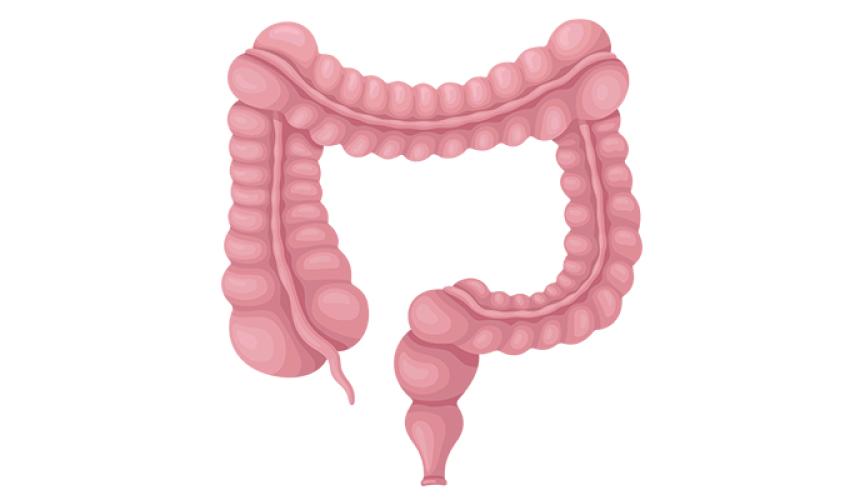About Colon and Digestive Tract Cancers
The digestive system consists of a series of hollow organs joined in a long, twisting tube (small and large intestines) from the mouth to the anus. The hollow organs of the digestive tract are the mouth, esophagus, stomach, intestines, and anus. Solid organs are also part of the digestive system and include the liver, pancreas, and gallbladder.
Our experienced team is specially trained to treat cancers of the digestive tract. Medical oncologists, radiation oncologists, surgical oncologists, gastroenterologists, oncology nurses, and more are with you to plan the right course of treatment, delivered with compassionate care.

“Dear Cancer: I Won’t Back Down.”
Inspired by her father’s cancer battle, Sherri Wunderlich, BSN, RN, OCN, now helps others face their own.

“Dear Cancer: You Will No Longer Be in Control.”
Dr. Rahimian knows the journey through cancer is never easy — but he also knows that with strong support, expert care, and personal connection, hope can take the lead.
Cancer Terms to Know
- Radiation oncologists - Doctors with special training in using radiation to treat cancer.
- Medical oncologists – Doctors with special training in diagnosing and treating cancer in adults using chemotherapy, hormonal therapy, biological therapy, and targeted therapy.
Types of Digestive Tract Cancer
Many types of digestive tract cancers are described in different ways. It can be confusing, but we’re here for you with answers.
- Anal cancer. This is a disease with cancer cells that form in the tissues of the anus. It is a rare condition, but the risk is higher if you have HPV, anal sex, or many sexual partners.
- Appendix cancer. This solid organ is viewed as having no major function in the body. Cancer develops when healthy cells in the appendix change, grow out of control, and form a tumor.
- Bile duct cancer. Also called cholangiocarcinoma, this cancer begins in the cells of the bile ducts. Bile is a digestive juice that gets pushed by the gallbladder into tubes called bile ducts. This form of cancer is rare.
- Gallbladder cancer. A pear-shaped organ that’s is found under your liver, the gallbladder stores bile that digests fat. This form of cancer is rare and is hard to diagnose in its early stages.
- Rectal cancer. The rectum and colon are part of the large intestine, which is why the disease is usually called colorectal cancer. It occurs when tumors form in the lining of the large intestine.
- Small bowel cancer. The condition develops when cells in the small intestine start to grow out of control. The small intestine helps process food for energy and rids your body of solid waste. It is not as common as most other types of digestive tract cancers.
- Stomach cancer. The stomach is an organ between the esophagus and the small intestine. This form of cancer mostly affects older people who are over age 65.
Diagnosing Digestive Tract Cancers
We use advanced tools and methods to diagnose digestive tract cancers.
- Barium enema. A barium-containing solution coats the lining of the esophagus, stomach, and intestines to help show abnormalities of the lining of these organs.
- Biopsy. Often, this test is the only way to be certain if a person has some type of digestive tract cancer. Cells are removed from the tumor or growth and examined in the lab.
- Endoscopic procedures. These tests use a flexible lighted tube (endoscope) that has a video camera on the end. It lets the doctor see any abnormal areas in the lining of the digestive organs clearly on a monitor. Small samples of any abnormal areas can also be biopsied through the endoscope. Different kinds of endoscopic tests may be used: including esophagogastroduodenoscopy (EGD), endoscopic ultrasound (EUS), colonoscopy and sigmoidoscopy.
- Imaging tests. Pictures are taken of the inside of your body to look for cancer, learn how far it has spread, and help see if treatment is working. Types of imagining tests include computed tomography (CT) scans, nuclear medicine scans (such as bone scans and thyroid scans) and magnetic resonance image (MRI) and positron emission tomography (PET) scans.
- Laparoscopy. Although CT or MRI scans can make detailed pictures of the inside of the body, they may miss certain tumors, especially if they’re tiny. Doctors might do a laparoscopy before any other surgery to help confirm cancer can be removed completely with surgery.
- Serum tumor marker test. The doctor takes a sample of blood. The sample is examined to measure the amounts of certain substances released into the blood by organs, tissues, or tumor cells in the body.

Treating Digestive Tract Cancers
These cancers are most often treated with surgery and are sometimes combined with chemotherapy or radiation. Your multidisciplinary team of cancer experts will work with you to create a plan that’s based on your unique diagnosis. Treatments may include:
- Chemotherapy (chemo). This treatment can cure or help control cancer and ease its symptoms. Chemo treatments use specialized medicines to kill cancer cells. One such chemo treatment approach is hyperthermic intraperitoneal chemotherapy (HIPEC). This procedure treats digestive tract cancers that have spread to the lining of the abdomen. It’s combined with surgery and uses a heated chemo solution that circulates throughout the abdominal cavity while the patient is in the operating room.
- Immunotherapy. Your immune system protects your body from illness and harmful foreign substances. Immunotherapy is just one of the forms of precision medicine we offer that boosts your body's immune system and helps it recognize and attack cancer cells.
- Interventional radiology (IR). This minimally invasive, image-guided technique treats cancers that only open surgery used to be able to address. These treatments include:
- Chemoembolization. This delivers cancer-killing medicine through a tube to the affected organ.
- Cryoablation. Extremely cold temperatures are used to freeze the tumor.
- Radiofrequency ablation. Transforms an electric current into heat to destroy the tumor.
- Radiation therapy. Usually used as a local treatment for these cancers, which means it targets and affects only the part of the body that needs treatment. Some of these therapies use radioactive substances that are given in a vein or by mouth and travel through the body, where it mostly collects in the area of the tumor.
- Surgery. Treating digestive tract cancers with surgery depends mainly on whether or not cancer can be removed completely. Many of our surgical oncologists offer laparoscopic and minimally invasive robotic procedures utilizing state-of-the-art equipment. Surgical specialists also offer Hepato-Pancreato-Biliary surgery to treat malignant and benign liver, pancreas, gall bladder, and bile duct disease.

